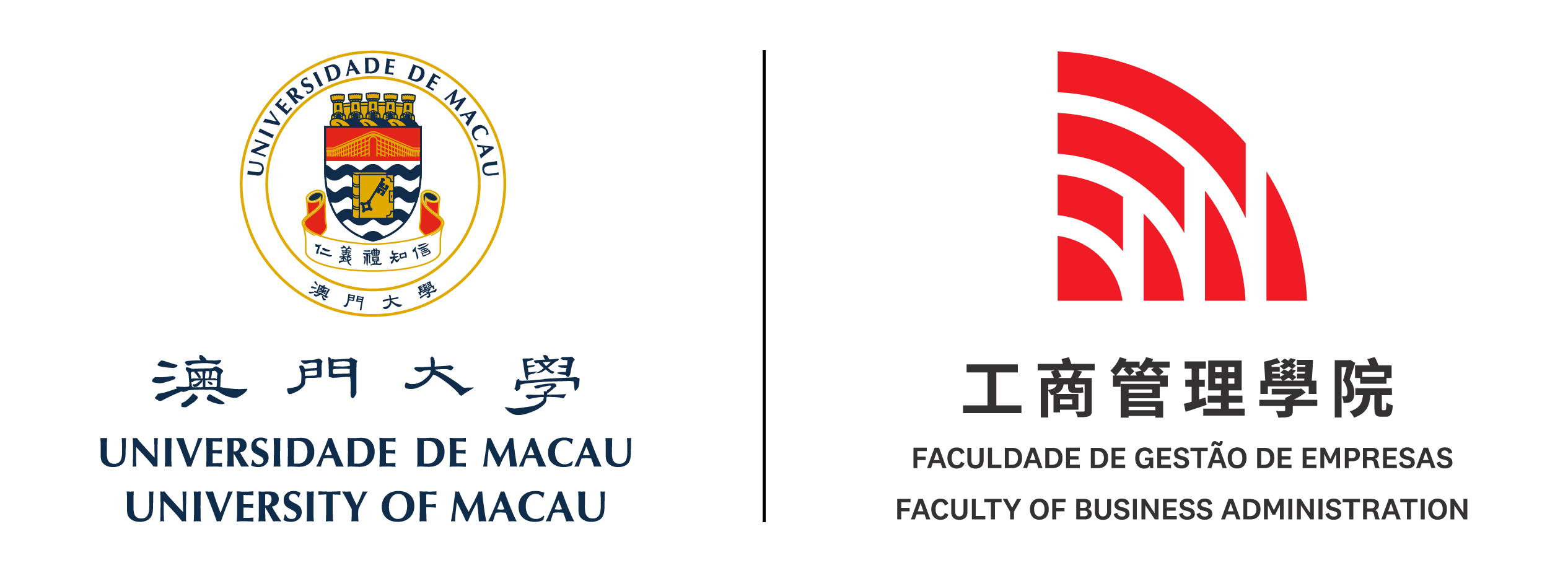
Associate Professor in Management
- Ph.D., University of Sheffield, United Kingdom, 2001
- M.B.A., Asia International Open University, Macao, 1992
- B.Sc.Ed. in Mathematics, University of Malaya, Malaysia, 1988
- Sept 2007 – Present: Associate Professor in Management, Faculty of Business Administration, University of Macau
- May 2001 – August 2007: Assistant Professor in Management, Faculty of Business Administration, University of Macau
- 1993 – May 2001: Lecturer in Management, Faculty of Business Administration, University of Macau
- May – July 1995: Visiting Scholar, Tokyo Keizai University, Tokyo, Japan
- 1988 – 1992: Teaching Assistant, Faculty of Business Administration, University of Macau
- Undergraduate Courses
- Business, Society and Entrepreneurship (GSEB2002)
- Quality Management (MGMT3008)
- Organizational Change and Development (MGMT3007)
- Principles of Business Management (MGMT110 )
- Special Topics in Human Resources Management (MGMT485)
- Business Ethics (MGMT413)
- Postgraduate Courses
- Human Resources Management (MGMT7032)
- Principles of Management (IMBB002)
- Innovation and Entrepreneurship
- Managerial Cognition
- Organizational Transformation
- Organizational Culture
- Zhang,Y.B. and Kong, S.H. (2018). ‘A Struggle for the Soul of Chinese Family and its Implications for Chinese Management’, International Journal of Arts and Commerce 7: 5, 71-87.
- Zhang, Y.B. and Kong, S.H. (2017). ‘The Development of Managerial Assumptions about Human Nature in China: A Tale from Quanzhou’, Cultural and Religious Studies 5: 12, 703-716.
- Wong, W.C. and Kong, S.H. (2017). ‘What does the ‘inner world’ of Chinese managers tell us about their management values, thoughts and practices? An ethnographic study’, Asia Pacific Business Review, 23:5, 625-640.
- S.H.J. Chan, X. Mai, O.M.K. Kuok, S.H. Kong. (2016). ‘The influence of satisfaction and promotability on the relation between career adaptability and turnover intentions’, Journal of Vocational Behavior Vol. 92, pp. 167–175.
- Wong, J. and Kong, S.H. (2014). ‘The Mainland Chinese Managerial Behaviors and Assumptions since the Economic Reform: A Research Proposition’, Open Journal of Business and Management 2 (1), pp. 24-32.
- Kong, S.H. and Gao, B.Y. (2009) ‘Chinese Executives in Foreign-owned Enterprises: Managing in Two Cultures’, Strategic Change, Vol. 18 (3-4), pp. 93-109.
- Kong, S.H. (2009) ‘Paternalism Revisited: Organisational Leadership in mainland China’, International Journal of Chinese Culture and Management, Vol. 2 (1), pp. 56-72.
- Choi, M. K. and Kong, S.H. (2007) ‘The Motivation of NGO Leaders in Macau’, Euro Asia Journal of Management, Vol. 17 No. 1, pp. 61-78.
- Kong, S.H. (2006) ‘An Empirical Investigation of Mainland Chinese Organizational Ideology’, Asian Business and Management 5 (3), pp. 357-378.
- Kong, S.H. (2006) ‘The Significance of Organisation’s Fundamental Assumptions in Change Management – the Case of Mainland Chinese Organizations’, Problems and Perspectives in Management 4 (1), pp. 98-110.
- Chiu, S.F. and Kong, S.H. (2006) ‘The Brain-drain from Private to Public Sector in Macau: How to Make Sense of it’, Global Economics and Management Review 11: 125-148.
- Chung, S.F. and Kong, S.H. (2005) ‘An Exploratory Study of Crisis Management in the Care-Free City of Macau’, Euro-Asia Journal of Management 15 (2), pp. 133-148.
- Iao, I.M. and Kong, S.H. (2004) ‘MBA in Macau: Revolutionize or Perish’, Euro-Asia Journal of Management 14 (2), pp. 135-154.
- Kong, S.H. (2003) ‘A Portrait of Chinese Enterprise through the Lens of Organizational Culture’, Asian Academy of Management Journal 8 (1): 83-102.
- Kong, S.H. (2001) ‘In Search of the Roots of Chinese Organisations’, Global Economics and Management Review 6: 49-78.
- Kong, S.H. and Yeung, T. (1995) ‘The Issue of Change and Environmentalism as a Business Opportunity’, Euro Asia Journal of Management, Vol. 8, pp. 55-68.
- 江绍发 (主編) (2017) :《美好家庭 +》,澳门:新纪元国际出版社。
- 江绍发 (主編) (2014) :《何去何从:我们的世界?》,上海:上海社会科学出版社。
- Kong, S. H. (Ed.). (2011). Exploring New Paradigms for Community Building. Macao: New Millennium Publication International.
- Antonio, N.S., Kong, S.H., Lam, K.P., Noronha, C., and Antonio, T. (1999) Total Quality Management, Macau: Macau Foundation.
- Antonio, N.S., Kong, S.H., Lam, K.P., Noronha, C., and Antonio, T. (1999) Total Quality Management Training Manual, Macau: Macau Foundation.
- Umezawa, T., Kong, S.H. and Noronha, C. (eds.) (1996) The dynamic impact of culture on organization, Macau: Macau Foundation.
- 江绍发 (2015). 培养宗教团体的治理能力 – 澳门巴哈伊的若干经验。载于邱永辉,陈进国(编),《澳门宗教报告》(第81至100页)。北京:社会科学文献出版社。
- 江绍发 (2014). 对话 — 社区建设的根基。 载于卓新平,邱永辉(编),《宗教与可持续社区研究》(第75至96页)。北京:社会科学文献出版社。
- 江绍发 (2012). 宗教生活与社会经济发展的关系. 载于晏可佳(编),《巴哈伊的社会发展观》(第96至118页). 香港: 全球文明研究中心.
- 江绍发(2010). 家庭 — 构建和谐社会所不可或缺的一个教育机构。 载于吴元贵(编),《心灵教育 — 探讨巴哈伊新视角》(第42至66页)。香港:博学出版社。
- 江绍发 (2010). 构建内心和谐与繁荣社会的七大原则。载于蔡德贵(编),《宗教与内心和谐 — 追求内心和谐学术研讨会》(第14至23页)。香港:博学出版社。
- 江绍发 (2010). 借助科学与宗教重新审视管理学的人性预设. 载于国家宗教事务局宗教研究中心、巴哈伊教澳门总会(编),《共建和谐:科学、宗教与发展研讨会文集》 (第473至494页). 澳门:新纪元国际出版社。
- Kong, S.H. (1996) ‘A Brief Excursion to the Corporate Culture of Japanese Firms’, in Umezawa, T., Kong, S.H. and Noronha, C. (eds.) The dynamic impact of culture on organization, Macau: Macau Foundation, pp. 53-81.
- “反思當今索取文化的關鍵假設”,宗教與可持續發展國際論壇,(南京,2016年12月12-13日
- “在新興給予文化背景下理解簡素生活”, 第四屆尼山世界文明論壇,(山東曲阜,2016年11月16-17日)
- “Harnessing the Power of Conversation in Community Building”, Asian Consortium, HongKong Polytechnic University, 27 September 2015.
- “正義為照耀大同世界的光”,大同思想與人類未來學術研討會 (山東,曲阜聖源書院),2014年10月25日
- “儒學和巴哈伊信仰眼裡的真正財富”,第三届尼山世界文明论坛 (山东,济南),2014年5月22日
- “Revisiting the Managerial Assumptions of Human Nature with the Aid of Science and Religion”, Shanghai International Conference on Social Science (Shanghai, China), August 2011
- “Revisiting the premise of some common economic thoughts through the lens of a religion”, Religion and Economic Crisis Academic Symposium (HongKong, Department of Cultural and Religious Studies of Chinese University of HongKong), November 2009
- “品質管理學的若干假設”,第三屆泛珠地區品質論壇及第十三屆香港品質管理大會 (澳門),2009年3月.
- Kong, S.H. (2002) ‘The Transformation of State-owned Enterprises (SOE): will it happen at all?’, in Azali, M. et al (eds.) Asia Pacific Economic and Business Conference Proceedings Vol. 1, pp. 345-355.
- Kong, S.H. (2001) ‘Exploring a Chinese Organizational Culture in the Time of Economic Transition’, in Ramayah, T. et al (eds.) The 4th Asian Academy of Management Conference 2001 Proceedings Vol. 2, pp. 769-780.
- Making sense of organizational life through organizational stories: a Case of Chinese organization
- PhD Students
- Supervising doctoral dissertations in the areas of “managerial assumptions” and “Managers’ intellectual framework”
- Master Students
- Supervising Master theses in the areas of “organizational culture”, “managerial capabilities”, “managerial values” and “institutional capability building”

